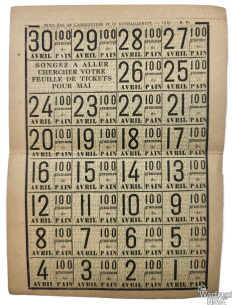Handwritten: "Réponse Nom Pierre Cretin 23 colonial Compagnie 7 Nr 1567. Gefangenen - Lager Langensalza", indicating the sender, Pierre Cretin, was from the 23rd Colonial Company, 7th Section, with the prisoner number 1567, writing from the POW camp at Langensalza in Germany.
Address: "Feld-Postkarte an Mademoiselle Mari de Lubersac 60 rue de Varennes Paris", showing the envelope was intended for Mademoiselle Mari de Lubersac in Paris, indicating a personal correspondence.
Postmark: "Postprüfstelle des Langensalza 15.5.7 Kriegsgefangenen Sendung Taxfrei", translating to "Post Inspection Office of Langensalza 15 May 1917 Prisoner of War Mail Duty-Free". This confirms the date and place of processing, with "Taxfrei" indicating no postage was required for POW mail.
Message:
"Langensalza 13 Mai 1917. Ma chère demoiselle. Je vous accuse réception du colis postal que vous avez eu la bonté de m'envoyer et je vous en remercie beaucoup. Je ne reçois toujours pas de vos bonnes nouvelles. Je vous serais reconnaissant de bien vouloir m'envoyer, si cela vous est possible, 1 Pantalon et une paire de pantoufles. Veuillez recevoir, ma chère demoiselle, mes bien respectueuses salutations. P. Cretin"
Translation: "Langensalza, May 13, 1917. Dear Miss. I acknowledge receipt of the postal package you were kind enough to send me, and I thank you very much for it. I still do not receive any good news from you. I would be grateful if you could send me, if possible, 1 pair of trousers and a pair of slippers. Please accept, dear Miss, my very respectful greetings. P. Cretin"
POW Correspondence: This envelope and its content highlight the personal connection POWs tried to maintain with the outside world, often requesting items necessary for their comfort or survival in captivity.
Colonial Troops: The mention of Pierre Cretin from a colonial unit underscores the role of France's colonial forces in WWI, with many soldiers from colonies ending up in German POW camps.
Langensalza Camp: This camp was one of many across Germany where POWs were held, often under varying conditions, from relatively humane to harsh, depending on the period and resources available.
Censorship and Postal Services: The postmark indicates the mail was checked, a standard procedure to ensure no sensitive information was shared. The "Taxfrei" status reflects international agreements on POW mail.
Even in captivity, the desire to connect with loved ones persisted, providing a humanizing element to the war's narratives, where personal stories interweave with the broader conflict.
Condition: Given its age and travel through wartime postal systems, this envelope exhibits signs of wear including fading, creases, or minor damage.
Historical Significance: An invaluable artifact for those collecting WWI memorabilia, with a focus on POW experiences, French colonial forces, or the postal history of wartime communications. It provides a direct connection to the personal lives of soldiers in captivity. Offers insights into the conditions of POW camps, the logistics of maintaining communication lines during war, and the cultural and personal impacts of captivity.
Note: This WWI envelope serves not only as a piece of history but also as a reminder of the personal sacrifices and the enduring human spirit during one of the darkest periods of modern history. It captures the essence of longing for home and the resilience of individuals far from their loved ones.





































